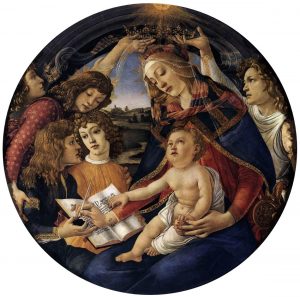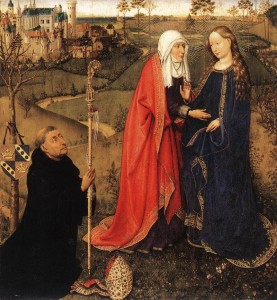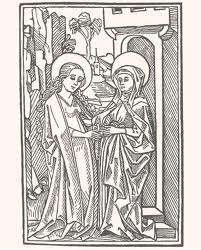Thoughts on Sunday’s Lessons for Dec. 22, 2024

Madonna del Magnificat (Madonna of the Magnificat), tempera painting on panel (1483) by Sandro Botticelli (1445-1510). Uffizi Gallery, Florence. (Click image to enlarge.)
First Reading: Micah 5:2-5a
God’s active, liberating preference for the poor and the oppressed is made manifest in Sunday’s readings. This theme may seem surprising at first, but it is in fact a deeply significant message for the impending birth of Jesus, who will hold up the poor, the hungry, the ill, and imprisoned and oppressed as the central focus of his good news. We begin with a reading from Micah, one of the earliest prophets in the Hebrew Bible. Micah has warned the people of Jerusalem that their injustices against the weak and the poor will bring down God’s wrath. In Sunday’s verses, Micah foretells that a new ruler was to come from the village of Bethlehem – the birthplace of King David – to reunite the surviving remnant of Israel as a shepherd leads his flock, all under God’s protection in peace.
Psalm: Canticle 15 (Luke 1:46b-55)
The Magnificat, Mary’s song of praise, may either be sung as Sunday’s Psalm or read as the second portion of the Gospel of the day. In this beloved story as told by Luke, the pregnant Mary sings out grateful praise for God. She rejoices in all that God has done for her, celebrating a powerful yet merciful God who loves us and calls us to acts of mercy and justice. God has brought down the powerful from their thrones and lifted up the lowly, she sings. God has filled the hungry with good things and sent the rich away empty. God’s justice is restorative – taking from those who have much and giving to those who have none.
Alternate Psalm: Psalm 80:1-7
Psalm 80 was likely written during a time of exile and destruction or recalls such a time. The place names in the second verse suggest lamentation over the loss of the Northern Kingdom – Israel – to the Assyrians. The first seven of its 18 verses resonate in sorrow as the people call on Israel’s God to come and help. The people, we hear in a memorable metaphor, have been fed with the bread of tears and given tears to drink. Though they have suffered the derision, laughter, and scorn of their enemies, including their own neighbors, the Psalmist expresses the belief that God has the power to save them through the light of God’s own countenance.
Second Reading: Hebrews 10:5-10
We return for this one Sunday to the Letter to the Hebrews, which we had visited extensively for several weeks this past autumn. Consistent with its theme of contrasting Jewish Christianity against Temple Judaism, it echoes prophecies of Isaiah and Amos, who warned of a God who “takes no pleasure” in temple sacrifices. Instead, it proposes that God’s promise to Israel at Sinai has now been fulfilled through the Incarnation of Jesus and his sacrifice on the Cross.
Gospel: Luke 1:39-45
This lovely reading includes the narrative that immediately precedes the Magnificat, the Song of Mary. The evangelist we know as Luke tells the story of Mary’s visit to her older cousin Elizabeth. Both women were pregnant – Elizabeth with John, Mary with Jesus – and both had conceived in miraculous ways after being visited by angels with the news that they would give birth. When the women meet, Elizabeth feels her child leap in her womb with what she perceives as joy. Elizabeth, suddenly filled with the Holy Spirit, declares Mary blessed among women. Elizabeth wonders in amazement, “Why has this happened to me, that the mother of my Lord comes to me?” Then, in the following verses, Mary responds with the Magnificat, the revolutionary song that we heard in the Canticle appointed for this day.



